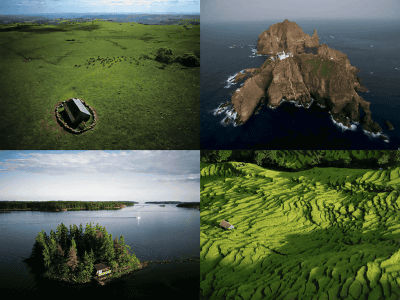How to survive for 3 days even if you get lost in nature

When walking in the wilderness such as mountain climbing and campsites, you may suddenly go off the road or lose track due to bad weather and get lost. Field & Stream, an outdoor news media, explains how to spend the three days before the rescue arrives at such times.
How to Survive for Three Days in the Wilderness | Field & Stream
According to Field & Stream, 'If you get lost in the woods or mountains, you'll usually be found within three days of being notified of your disappearance.' Therefore, at the military survival school, the way of thinking is changing from 'continuing survival for a long time' to 'certainly surviving the three days until rescue comes'. This is because the efficiency of search and rescue has improved, and if you set traps or hunt animals to survive for a long time, you will consume valuable energy to survive.
So Field & Stream explains how to spend the three days before rescue comes when you get lost in the woods.
◆ Day 1: Create a base
Most of the cases of getting lost in the forest are not when entering the forest, but when trying to leave the forest, and it is said that there are many evenings when it gets dark. The rescue team first searches the surrounding roads and paths with a flashlight, so it is important not to move around unnecessarily from where you are lost. So Field & Stream explains that the first day of the three days before being rescued begins with building a base.

Even experts in the outdoors often experience impaired visuospatial in the woods and panic with fear. Once panicked, they often deny the lost reality and blindly continue walking until their position and direction match the map and compass.
Therefore, on the first day, it is important to suppress the urge to panic, keep calm, and establish a base on the spot instead of walking. If possible, the place to make a base is a place with branches overhead and leeward. If it's bright, you can go to a place with a good view, but you should always make a mark along the way.
It is also important to pick up the fuel branches and bonfire at the base before it gets too dark. Then lay the backpack and its contents on the branches to make a bed. This will prevent you from becoming hypothermic.

◆ Day 2: Prepare a rescue signal
On the morning of the second day, the bonfire not only warms up, but the smoke also serves as a rescue request. Bonfire in areas that are easily found by the helicopter you are exploring, such as grasslands near the base or open ridges. Raw branches that are not dry are piled up on the flame and smoke. It is also important to make SOS signs from logs and rocks, not just bonfires. Don't forget to use a tarpaulin or an orange hunting vest to make it stand out.
Guns and whistles are also tools for seeking help. The SOS sign is '3 shots, 3 whistles, 3 shots'. Blindly blowing a whistle is not the right thing to do, but don't hesitate to blow a whistle. In addition, a mirror will allow the probe to reflect light as it passes overhead.

In the afternoon of the second day, we will concentrate on building a shelter at our base. Pillars are erected between the trees, large branches are erected, small branches are woven, and branches with leaves are layered to improve weather resistance. The important thing is to build the leaves on the branches so that the rainwater will flow to the ground.
If your work consumes a lot of energy, the most serious problem is dehydration. If you don't have the equipment to purify the water or the item that melts the thawed water, put the river water in a piece of aluminum foil or a can or bottle that is littered and boil the water. Drinking river water carries the risk of
◆ Day 3: Maintain patience and a positive attitude
On the third day, the voice in my head begins to whisper, 'No more help.' However, it is possible to shake off negative whispers by focusing on the chores at hand, such as collecting fuel and water for bonfires, reinforcing shelters, and sending rescue signals.

When the sun sets, it's easy to break your heart. However, it is important to be patient and look forward. If you don't get help by the afternoon, Field & Stream says it's important to use your head to make rational plans. If the weather is rough, it is likely that the exploration helicopter could not be launched and no rescue signal was found. In this case, it's best to stay still for a few days and wait for the weather to recover.
On the other hand, if the sky is clear and you can't hear the sound of a helicopter or the voice of a rescue team, it's reasonable to assume that the search range is different from you, before you lose power. You will have to consider moving your base. However, moving bases is also a last resort. 'The best way to save yourself is to ensure that rescue teams can find you, at least 72 hours, without moving from a lost point,' said Field & Stream.

Related Posts:
in Note, Posted by log1i_yk







